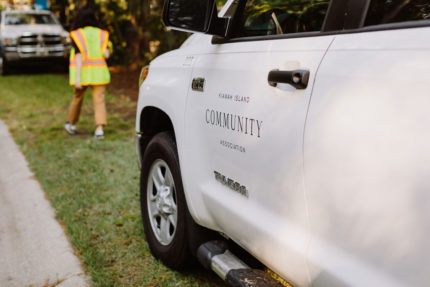Nov
01
2012
From The Blog
A Man With a 3-Cornered Hat
He is a lawyer but never practiced law, yet he is now a judge. He has been neither a scientist nor a conservationist, yet he chairs a land trust. He was never a teacher, yet now he works with school
children. He spent most of his life in New York, and worked for 35 years in the banking industry, primarily in business management and corporate staff roles. He now lives on Kiawah and wears a
3-cornered hat. Meet Greg Brown, municipal judge for the Town of Kiawah Island, chair of the Kiawah Conservancy, and public school volunteer and advocate.
Greg grew up in the small Hudson Valley town of Warwick, NY. He described his childhood. “It was an ideal place to grow up in the 1940’s and 50’s: 3,000 people nestled in a valley surrounded by apple orchards and dairy farms, a place and time of innocent simplicity. For a teenager, putting your arm around a girl at the movies was a big deal. My high school graduating class was 77 students, and I was the valedictorian, a big fish in a little pond.”
From Warwick, Greg went on to earn a BS in Economics at the University of Pennsylvania’s Wharton School and then a law degree from Fordham University School of Law in New York City. “Four years in Philadelphia and three in New York changed my small town perspective. I loved the city. In my final year of law school I accepted a job with First National City Bank [now Citigroup], and worked there for 35 years. I was hired as a lawyer but I never practiced law. I had three separate careers there, including several investment management assignments in my first 12 years, during which time we moved to Buffalo for two years when Citibank first expanded statewide.”
Greg met his wife, Alma – a British subject born in Bahrain and educated in England and Switzerland before attending Boston University – at Citibank in 1969, and they married two years later. In the late 70’s they moved to the town of Chappaqua, NY to have a yard for their 5-year-old son Ian and new puppy, and for the next 23 years, Greg commuted to the city. Greg and Alma moved to Kiawah in 2002, after buying a lot in 1998 where they planned to build their home for retirement. “In 1971 we vacationed in Hilton Head and fell in love with the lowcountry,” Greg said. “We vacationed all over the country, always with an eye for a retirement community. It had to have a temperate climate and golf. Alma wanted to be near the ocean, and because we valued the urban environment, it had to be near a classy city with culture and good restaurants. We eventually narrowed our choices to the Charleston and San Diego areas, and Charleston had much less crowding and traffic.”
The Hat’s Corner for the Conservancy
Greg became interested in the Kiawah Island Natural Habitat Conservancy’s work shortly after they bought their Kiawah land. “The island is so beautiful and precious, and anything we can do to help the environment and ecosystem is important to me. I don’t hunt or fish but I always had an affinity for the outdoors – for 10 years, from junior high to law school, I worked summers as a greens keeper at the local golf club. I think we were the only family in Chappaqua without a lawn service; I kept my yard looking like the grass at Yankee Stadium. “ He has served on the conservancy board for seven years, starting with the business, tax and legal committee, then two years as treasurer and two as vice chair. After his term as chair ends in March, he will serve two more as chair emeritus.
Conservancy business is an almost daily affair. The conservancy has a board of nearly 30 members which meets four to five times annually, and eight or nine working committees. The Executive Committee, comprised of the officers and committee chairs, makes most decisions, which the board must ratify. Greg and his vice chair, Sue Corcoran, meet weekly with Executive Director Donna Windham. Among Greg’s accomplishments as chair is the creation of two new committees focused on strategy/planning and habitat improvement. The 2020 strategic plan effort is being led by
Sue and should be finished soon. Other goals include encouraging more people to become involved with the conservancy. “We have over 4,000 member households on the island, and only 10-12% contribute to the conservancy,” he noted. “We don’t expect many people to make us their top charity, but we would like to be on their list. Everyone with property here has an interest in keeping the island a great place to live.” He pointed out that with property being so expensive; it doesn’t make sense to make land acquisition the top priority of the organization. Focusing on a robust habitat improvement program makes more sense.
The Hat’s Corner for the Municipal Judge’s
Greg’s judicial work is less time consuming than the conservancy chairmanship, “no more than an hour a week,” he said. He applied for the job on a whim in 2003, after Jack Matthews, Kiawah’s only judge since the town’s inception, left Kiawah. “I was reading Town Notes and saw they were seeking resumes. I think one reason I got the job was that I was a lawyer. There are about 300 judges like me in South Carolina, at least one in every city, town or unincorporated area. Only about 15% of us are lawyers.”
In all but two states, judges are elected in general elections or are appointed by the executive branch of government. In North and South Carolina, they are elected by the legislative branch, which in Kiawah means the Town Council. The Kiawah municipal judge serves a three-year term and like Kiawah’s other government representatives, is not paid. Kiawah’s court is a “summary court,” which handles only criminal cases involving fines up to $500 or jail terms up to 30 days. Anything more serious goes to the circuit court.
New judges are required to attend a week-long “judges’ school” and pass a test. “It was relatively easy for me, because I was trained as a lawyer,” Greg recalled. “There were 20 people in my class, and four weeks later we had the test. I expected the same 20 people, but there were at least 50. All the judges who hadn’t passed the test had to come back every six months to try again.” Furthermore, all judges must do 12 hours of continuing legal education each year to remain qualified.
Greg takes his responsibilities seriously. “I am willing to do things at midnight if necessary, and on weekends. Lately I have stepped up the number of court sessions from twice a month to weekly, to make it easier for the deputies we hire to come to court. I hold it on a different day each week so the deputies can’t say they can’t make it. Once a month I hold a ‘livability court’ modeled on Charleston’s to handle violations of the town’s code of ordinances. For instance, we initially work with dog owners to find ways for them to abide by the ordinance rather than receiving a summons. We have a plan for underage drinking and possession offenses; I don’t want to ruin a kid’s life for drinking a beer at the beach. So if they choose to take an online course on alcohol abuse prevention and do community service at home or school, a record won’t follow them around.”
Occasionally Greg makes a controversial decision. “I held the town’s noise ordinance unconstitutional,” he recalls. “There is no law now and the town is working on an alternative. The Town Council was not pleased, but this is what government is about. There are three branches that check each other. Fortunately, the Town Council can’t fire me if I do something they don’t like, though they don’t have to reappoint me for another term.” The case was a rare one because it went to trial. The resort had been ticketed for violating the ordinance during a party at Mingo Point. The town’s chief code enforcement officer represented the prosecution and Roger Warren acted as the resort’s defense lawyer.
Although Roger did not raise the constitutionality issue, when Greg reviewed the law, he determined that it was invalid. Most court cases are traffic related and many more are town ordinance
violations, usually failure to obtain a business license. Other cases in recent years have included underage alcohol possession, restraint of pets, narcotics possession, disturbing the peace, failure to cooperate with or giving false information to law enforcement officials, illegal possession of fireworks, fraudulent checks, petit larceny, criminal domestic violence, disorderly conduct and littering. While most cases are routine, Greg remarked, “Once in a while I get something juicy that requires research.”
The Hat’s Corner for the Schools
In 2003, looking to be involved in his new community, Greg began tutoring elementary school children. He began at the Neighborhood Learning Center run by Church of Our Saviour. When after school programs moved to the schools in 2005 because buses were no longer available to transport students, he started tutoring at Frierson Elementary School on Wadmalaw Island, where he had previously volunteered in a summer program. He now spends every Monday morning during the school year at Frierson. In addition, he has participated in annual recruiting efforts to encourage additional volunteers to connect to the Johns and Wadmalaw Island schools, most recently through the new highly touted Kiawah Cares program. Greg measures his success by the fact that nine tutors have volunteered at Frierson so far this year.
“Wadmalaw is an amazing island community,” he said. “It’s a rural oasis, strikingly different from Johns Island. It’s insular, with community life focused on family, church and its beloved Frierson school. Children at Frierson have wonderful values and are eager to learn but have limited exposure to the world beyond the island. Many have never seen the ocean, even though they live only a few miles from it.”
Greg is also a community member of the Haut Gap School Improvement Council, and he previously worked with Haut Gap students as a Run Buddy, a program which pairs volunteers with children who need guidance in developing a healthy lifestyle. After training during the year, the Run Buddy and the child participate together in the Bridge Run. Greg swears by his 3-cornered hat. He concluded, “At the conservancy, I believe I have helped the organization become more management and process focused. I have put more emphasis on running the organization like a business. This means having certain processes we follow; for example, employees are entitled to job descriptions, annual goal setting sessions and performance reviews.
“The nicest thing about being a judge is that I don’t have to get involved in politics. I am a political independent and I think that helped me get the job. We have strict ethical standards and can be for violations. I cannot be seen ‘holding hands’ with anyone on the Town Council, give money or write endorsements for candidates for office – even friends. I can’t even wear a button or display a bumper sticker, not for anyone at any political level. I am honored to be a part of the town government and the greater judicial world, even on the bottom of a fat pyramid of judicial hierarchy.
I thought I would retire to Kiawah and read books and play a lot of golf. I do play golf two or three times a week and also have been involved in the arts – I am currently a board member of Chamber Music Charleston. My days are full, and my volunteer activities all mean a lot to me.”

